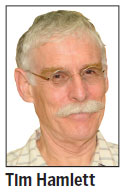Opposition to planned new low-cost airline puzzling
Updated: 2014-05-27 07:11
By Tim Hamlett(HK Edition)
|
|||||||||
A chorus of voices has arisen to protest the possibility of Hong Kong getting a new low-cost airline. This is something of a puzzle. I do not recall a chorus of complaints when we were threatened - in vain, alas - with a low-cost supermarket. Cheaper phones or computers do not inspire opposition, regardless of where they are made.
There is scope for a certain amount of legal tap dancing here. Hong Kong's regulations in these matters require a "local" airline to have its principal place of business in Hong Kong. The current candidate, Jetstar, is the corporate offspring of an Australian company. This has allowed some of the more resourceful critics to suggest it would be illegal to license Jetstar or even - quelle horreur! - a breach of the Basic Law.
On the other hand, faced with a chorus of this kind, I am often reminded of the late, great economist Adam Smith, who said, "People of the same trade seldom meet together, even for merriment and diversion, but the conversation ends in a conspiracy against the public, or in some contrivance to raise prices."
Airlines are a regulated industry, for historical reasons. This exposes those currently engaged in the industry to the temptation to repel newcomers, and to use for this purpose whatever arguments come to hand. These battles used to be fought in public hearings of the Air Transport Licensing Authority. They often made interesting reading. Regular travelers would testify that the route concerned was already magnificently served by the incumbent (usually, but not always, Cathay Pacific) and would be countered by surveys suggesting large numbers of people were dying to see another airline on the route.

Witnesses appearing as representatives of the traveling public were occasionally subjected to scathing cross-examination. I still remember one man who after detailed questioning about his many contacts was reduced to attributing his views to people he had met in the Hong Kong Club. But in those days the discussions were comparatively gentlemanly, because all the airlines charged roughly the same prices anyway.
Nowadays we have changed all that. There are low-cost airlines which charge you extra for peanuts and luggage but offer a low basic fare. There are what we may tactlessly call high-cost airlines, which charge traditional prices and feed you. Which you prefer depends heavily on how long the flight is going to be. Flights within Europe now seem to be dominated by the cheapies, although this has its downside. A couple of years ago I met a Scottish bagpipe band who had flown from Edinburgh to Poznan on Ryanair, an early pioneer of charging extra for everything. In order to reap the advantages of the cheap basic price they had decided to travel in their heaviest clothes, which was the uniform they performed in. So they flew into Poland in the full kit: kilts, tunics, long socks, and huge hairy hats. This would probably not raise an eyebrow in Edinburgh but was very conspicuous in Poznan.
Our local high-price airline, Cathay Pacific, seems to be very high-price indeed. In fact if like me you look for the lowest price (or at least the lowest that doesn't involve Ryanair or Aeroflot), there is usually a cheaper alternative, so I rarely fly Cathay. But air ticket pricing has now become as mysterious as the inner workings of the Kremlin. The whole thing has been computerized, with bewildering results.
Still, at the end of the day it seems that ticket prices will behave roughly as Adam Smith predicted they would, and if a low-cost operator is introduced then prices generally will fall. This observation will no doubt cue much wailing from the current airlines along the lines of their imminent bankruptcy and faint hopes of making profits even under the present arrangements.
And this, I fear, is what all the fuss is about. Those airlines which currently enjoy "home" status do not wish to share it with a newcomer. They wish, in other words, to be protected. Some of the arguments offered make no bones about this - if outsiders are allowed to run flights from Hong Kong the money made will go abroad instead of staying here. But this argument could be used to resist foreign ownership of everything from taxicabs to hotels. The modern idea of regulation is that it is here to serve the interests of consumers, not producers.
The producers will not have this. Or at least they will not publicly admit it. They will parade as public servants, the moon creating the tide which lifts all boats, the originators of general prosperity to whom the making of a profit is a sort of happy by-product of their efforts to serve the people. Adam Smith again: "I have never known much good done by those who affected to trade for the public good."
The author's work in journalism has won him honors in the Hong Kong News Awards and the International Radio Festival of New York. He is well known as a columnist, reviewer and broadcaster.
(HK Edition 05/27/2014 page7)